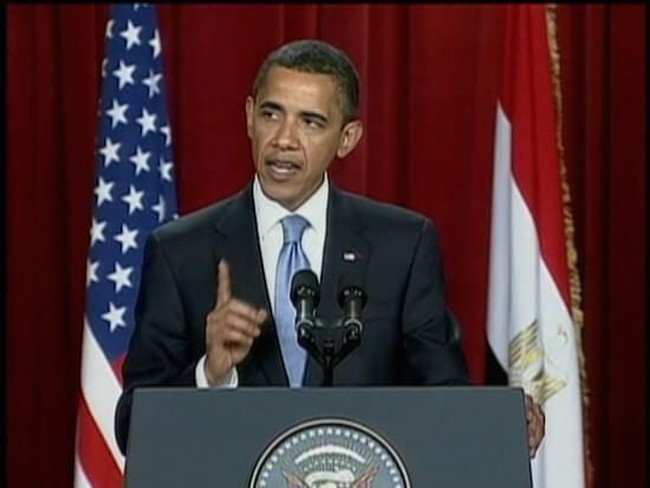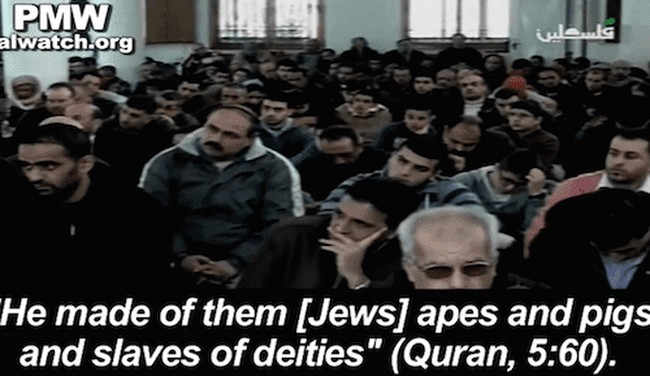Allah spends most of Sura 5, “The Table,” castigating the Jews and the Christians for their various sins and offenses. If you think he was angry with them in suras 2-4, you ain’t seen nothing yet.
This sura dates from the Medinan period (as do suras 2-4) — according to Islamic tradition, this was the latter part of Muhammad’s career, when his revelations were longer, angrier, and more violent. Allah begins by exhorting Muslims to obey his commands regarding food, religious observances, and sexual morality (vv. 1-11). He permits Muslim men to marry not only “chaste women from among the believers,” but also “chaste women from among those who were given the Scripture before you” (v. 5).
However, he says nothing about Muslim women being permitted to marry non-Muslim men, and indeed, this is prohibited in Islamic law.
This is part of the subjugated status of the dhimmis, the “protected people,” in Islam: traditionally a man takes his wife into his own household, but not vice versa. The prohibition of Muslim women marrying non-Muslim men, and the allowance of Muslim men marrying non-Muslim women, means that the Islamic community will always be in a position to grow, while the non-Muslim community declines.
Then, Allah returns to raking the Jews and Christians over the coals (vv. 12-26). Allah, he tells us, “had already taken a covenant from the Children of Israel” (v. 12), but the Jews broke it. And so “for their breaking of the covenant We cursed them and made their hearts hard.”
Why? Because they have altered the revelations they received from Allah: “They distort words from their usages and have forgotten a portion of that of which they were reminded.” (v. 13) Allah warns Muslims that they will find Jews to be just as treacherous today: “And you will still observe deceit among them, except a few of them.”
Nonetheless, he tells Muslims to “pardon them and overlook. Indeed, Allah loves the doers of good.” (v. 13). According to Allusi in his Ruhul Ma’ani, this forgiveness should be extended only to those Jews who become Muslims or agree to pay the jizya and accept subservient dhimmi status in accord with 9:29. Tabari, on the other hand, suggests that v. 13 was abrogated by the commands to wage jihad against the unbelievers that came later in Muhammad’s career.
The Christians, meanwhile, “forgot a portion of that of which they were reminded,” so Allah punished them: “We caused among them animosity and hatred until the Day of Resurrection” (v. 14). Thus as far as the Qur’an is concerned, the divisions among Christians demonstrate the falsity of the religion — a proposition for which Jesus stated the obverse: “By this all men will know that you are my disciples, if you have love for one another” (John 13:35).
Says Ibn Kathir, “Indeed, the numerous Christian sects have always been enemies and adversaries of each other, accusing each other of heresy and cursing each other … Each sect among them will continue to accuse the other of disbelief and heresy in this life and on the Day when the Witnesses will come forth.” The Jews and Christians should accept Islam, as it reveals what they have concealed: “O People of the Scripture, there has come to you Our Messenger making clear to you much of what you used to conceal of the Scripture and overlooking much. There has come to you from Allah a light and a clear Book.” (v. 15).
Allah, in several places in the Qur’an, presents himself as the arbiter between these warring Christian sects, clearing up questions that are disputed among them. Thus when asserting that Jesus was not crucified, but someone who looked like him was crucified in his stead (a position held by some Gnostic Christian sects), Allah says “those who differ over it are in doubt about it. They have no knowledge of it except the following of assumption. And they did not kill him, for certain.” (4:157) And here the Qur’an declares that those Christians who believe that “Allah is Christ, the son of Mary” have “certainly disbelieved.” The Arabic word used here is kafara, (كَفَرَ); it is a form of kufr, unbelief.
Islamic spokesmen in the West frequently assert that the Qur’an never refers to Christians as infidels or unbelievers, when in fact this verse is quite clear that those who believe in the divinity of Christ are unbelievers indeed. To those Jews and Christians who claim to be God’s children, Allah directs Muhammad to retort, “Then why does He punish you for your sins?” (v. 18).
Then Allah retells the story of Cain and Abel (vv. 27-34), culminating in one of the most oft-quoted verses of the Qur’an, the one that Presidents Bush and Obama, as well as many other Western non-Muslim leaders, refer to most frequently:
Because of that, We decreed upon the Children of Israel that whoever kills a soul unless for a soul or for corruption in the land — it is as if he had slain mankind entirely. And whoever saves one — it is as if he had saved mankind entirely. And our messengers had certainly come to them with clear proofs. Then indeed many of them, after that, throughout the land, were transgressors. (v. 32)
There is less to this than Western leaders and Islamic apologists claim.
In his 2009 Cairo speech, Obama selectively quoted a pivotal verse damning the Jews. Obama made it seem to be a verse upholding the Western view regarding the infinite value of each life.
First, note that it is not a general prohibition of killing — there are big exceptions for those who kill “for a soul or for corruption in the land.” Second, this is not a general command, but one only for the Children of Israel. Third, “many of them, after that … were transgressors” — so all it is really saying is that Allah gave a command to the Children of Israel and they transgressed against it.
(Meanwhile, some Islamic authorities interpret this passage in a supremacist manner, as applying only to Muslims: Sa’id bin Jubayr explains: “He who allows himself to shed the blood of a Muslim, is like he who allows shedding the blood of all people. He who forbids shedding the blood of one Muslim, is like he who forbids shedding the blood of all people.”)
Never mentioned by the many who quote this verse as if it condemns Islamic jihad violence are the caveats above.
Nor do they mention that it is followed by v. 33, which specifies the punishment for the corruption and transgressions of the Children of Israel: “Indeed, the penalty for those who wage war against Allah and His Messenger and strive upon earth corruption is none but that they be killed or crucified or that their hands and feet be cut off from opposite sides or that they be exiled from the land. That is for them a disgrace in this world; and for them in the Hereafter is a great punishment.”
Thus this passage is explaining what must be done with Jews who reject Muhammad, not dictating lofty moral principles. Ibn Warraq sums it up: “The supposedly noble sentiments are in fact a warning to Jews. ‘Behave, or else’ is the message. Far from abjuring violence, these verses aggressively point out that anyone opposing the Prophet will be killed, crucified, mutilated, and banished!”
Allah follows that with more warnings of hellfire (vv. 35-40). Amidst them, he prescribes amputation of a hand for theft (v. 38). Said Muhammad: “Let there be the curse of Allah upon the thief who steals an egg and his hand is cut off, and steals a rope and his hand is cut off.”
In verses 41-60, Allah consoles Muhammad for the Jews’ and Christians’ rejection of him, and he and his message are again presented as the crown and completion of the messages brought to them by their prophets. But the Christians are told: “let the People of the Gospel judge by what Allah has revealed therein” (v. 47), which seems to suggest that Muhammad was assuming that the Christian Scriptures were not corrupted in his day, although today it is common Islamic teaching that the New Testament as we have it is not the original, but has been altered by wicked Christians to reflect their false doctrines.
Thus Muslims are not to befriend Jews and Christians (v. 51); Ibn Kathir explains: “Allah forbids His believing servants from having Jews and Christians as friends, because they are the enemies of Islam and its people, may Allah curse them.” Allah continues in this vein in vv. 52-60, excoriating the hypocrites and the People of the Book (most of whom are “defiantly disobedient” — v. 59), reminding them that some of “those whom Allah has cursed and with whom He became angry” were transformed into “apes and pigs” (v. 60).
Always a popular line. How many Jews have been murdered by those inspired by its dehumanization?
Allah is just getting warmed up in expounding upon the wickedness of the Jews and Christians. In vv. 61-86, he criticizes the Jews and Christians for refusing to follow Muhammad. Why don’t the Jews’ rabbis stop their evil behavior (v. 63)? They even dare to say that “the hand of Allah is chained” (v. 64).
Allah’s hand is chained? It is unclear what Jewish concept, if any, the Qur’an is referring to in this case. Ibn Kathir comments: “Allah states that the Jews, may Allah’s continuous curses descend on them until the Day of Resurrection, describe Him as a miser. Allah is far holier than what they attribute to Him.” He is also absolute will, with hand absolutely unchained: Allah’s unchained hand is a vivid image of divine freedom. Such a deity can be bound by no laws. Muslim theologians argued during the long controversy with the heretical Islamic Mu’tazilite sect, which exalted human reason beyond the point that the eventual victors were willing to tolerate, that Allah was free to act as he pleased. He was thus not bound to govern the universe according to consistent and observable laws. “He cannot be questioned concerning what He does” (Qur’an 21:23).
Accordingly, there was no point to observing the workings of the physical world; there was no reason to expect that any pattern to its workings would be consistent, or even discernible. If Allah could not be counted on to be consistent, why waste time observing the order of things? It could change tomorrow. Stanley Jaki, a Catholic priest and physicist, explains that it was the renowned Sufi thinker al-Ghazali who “denounced natural laws, the very objective of science, as a blasphemous constraint upon the free will of Allah.” The great twelfth-century Jewish philosopher Moses Maimonides explained orthodox Islamic cosmology in similar terms, noting that Islamic thinkers of his day assumed “the possibility that an existing being should be larger or smaller than it really is, or that it should be different in form and position from what it really is; e.g., a man might have the height of a mountain, might have several heads, and fly in the air; or an elephant might be as small as an insect, or an insect as huge as an elephant. This method of admitting possibilities is applied to the whole Universe.”
Relatively early in its history, therefore, science was deprived in the Islamic world of the philosophical foundation it needed in order to flourish.
It found that philosophical foundation only in Christian Europe, where it was assumed that God was good and had constructed the universe according to consistent and observable laws. Such an idea would have been for pious Muslims tantamount to saying, “Allah’s hand is chained.”
Allah also says that whenever the Jews “kindled the fire of war, Allah extinguished it.” (v. 64) That is, says the Tafsir al-Jalalayn, “war against the Prophet(s).” According to Bulandshahri, “The Jews make every effort to instigate wars against the Muslims, but Allah foils their attempts each time, either by instilling terror in their hearts or by their defeat in these battles.” The Jews also “strive to do mischief on earth” — that is, fasaad (فَسَاد) — for which the punishment is specified in v. 33: offenders must be “killed or crucified or that their hands and feet be cut off from opposite sides or that they be exiled from the land.”
Allah exhorts the Jews and Christians to follow what is written in the Torah and Gospel, and promises Paradise to those who do so (vv. 66, 68-9). This is not (as it is often represented) a manifestation of ecumenical generosity, but rather an expression of the Qur’an’s assumption that it confirms the message of the earlier books, which prophesied Muhammad’s coming.
Ibn Kathir tells Jews and Christians that they will have “no real religion until you adhere to and implement the Tawrah [Torah] and the Injil [Gospel]. That is, until you believe in all the Books that you have that Allah revealed to the Prophets. These Books command following Muhammad and believing in his prophecy, all the while adhering to his Law.”
Then Allah in v. 72 repeats the denial of the divinity of Christ — and the labeling of those who believe in it as “unbelievers” — of v. 17, and in v. 73, he repeats the denial of the doctrine of the Trinity from 4:171. Jesus and his mother are again presented as the other members of the divine trio with Allah, but they were mortal: they both used to eat earthly food (v. 75) — “like all other human beings,” says the Tafsir al-Jalalayn, and one who is such cannot be a god because of his compound being and fallible nature, and because of the [impurities such as] urine and excrement that he produces.” The actual Christian concept of the Incarnation, with Christ being both fully God and fully human, doesn’t enter into consideration.
Meanwhile, for their part the disbelieving Jews are cursed by both David and Jesus for their disobedience (v. 78). The Muslims will find that these Jews are their fiercest enemies, while those closest to them in affection will be the Christians (v. 82). According to the Ma’alimut Tanzil, this verse doesn’t refer to all Christians, but only to those who accept Islam; this is made clear by verses 83 and 84, in which those Christians accept Muhammad’s message.
Allah then turns back to where he began in this sura establishing various regulations for the Muslims (vv. 87-108). Among them is the directive that one who breaks an oath must in expiation feed ten indigents or free a slave (v. 88). He says that alcohol and gambling are “Satan’s handiwork” (vv. 90-91) — and thus definitively forbidden. He destroys the possibility of free inquiry in Islam when he warns Muslims not to “do not ask about things which, if they are shown to you, will distress you.” However, “if you ask about them while the Qur’an is being revealed, they will be shown to you” (v. 101) — odd that a perfect and eternal book would depend for its contents upon the questions of human beings at a particular time, but Allah’s ways are mysterious. Still, it is better not to ask questions: “A people asked such before you; then they became thereby disbelievers.” (v. 102) Which may explain the touchiness of some imams when asked questions.
Then Allah turns attention again to Jesus, emphasizing his status as a prophet of Allah, who did all his mighty works by order of Allah — and is thus not God himself (vv. 109-120). The miracle of the clay birds becoming live ones (v. 110) is found in the second-century Gnostic text the Infancy Gospel of Thomas. It’s likely that Gnostics had left the Eastern Roman Empire, where they faced persecution, and settled in Arabia. The name of this sura comes from vv. 112-115, which recount when Jesus asked Allah for a table laden with food from heaven, which would be “a festival for the first of us and the last of us and a sign from You.” (v. 114) A table from Allah would be a festival for Jesus and his followers — this appears to be a vestige of the Christian Eucharist: the consuming of the Body and Blood of Christ in the form of bread and wine, which was central to all Christian groups in Muhammad’s time. In v. 116, Allah asks Jesus directly: “O Jesus, Son of Mary, did you say to the people, ‘Take me and my mother as deities besides Allah’?” Jesus, of course, denies having done so. Those who believe otherwise will be punished.














Join the conversation as a VIP Member